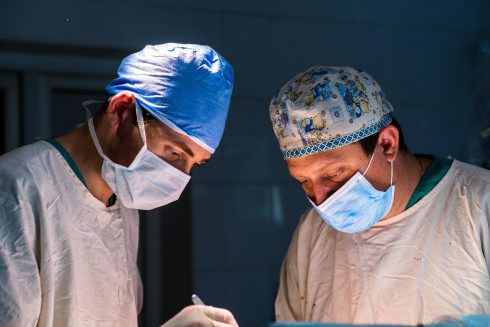A NEW study has revealed the brain disease, Alzheimer’s, can spread between humans.

Experts have found evidence of at least five people contracting the illness.
Each person who caught the memory erasing condition were amongst 1,848 people injected with growth hormones full of toxic amyloid-beta protein ‘seeds’, or prions, as children.
They all developed the same early onset variant of the condition.
Now, others who received the same treatment are considered ‘at risk’ of developing Alzheimer’s.
For some 27 years between 1958 and 1985, unusually short children were given hormones harvested from human corpses to help encourage their growth.
Used in the UK and US, it was found that some batches were contaminated with prions that led to a deadly, incurable brain disorder known as Creutzfeldt-Jakob Disease (CJD).
The illness, closely linked to mad cow disease, led doctors to instead use synthetic hormones.
Researchers now believe other medical procedures could lead to Alzheimer’s disease as prions can survive medical grade sterilisation methods.
Prions can encourage illnesses by accumulating in the brain and killing neurons, a vital part of brain function.
According to the NHS, the accumulation of prions can lead to plaque deposits.
This abnormal build-up of proteins in and around neurons is believed to lead to Alzheimers.
The latest research was carried out by University College London.
Speaking to the Daily Mail, researcher Professor John Collinge, said we must take action to prevent future accidental transmissions.

He said: “We are now planning to look at ways of destroying prions from surgical equipment with disease-related proteins.”
The memory robbing disease was formerly thought to come in two forms.
Most common is the ‘random’ variant suffered by thousands over the age of 65.
The other variant was a genetic early-onset type that runs in families.
Scientists at UCL now claim they have identified a third variant which can be passed from person to person and is very rare.
They tested batches of the infected growth hormone stored in the Department of Health archive.
Stored as a dried powder, researchers tested the hormone on mice and found it triggered the production of proteins known to cause Alzheimer’s.
According to Professor Collinge, the at-risk group is very small, containing patients who have undergone certain neurosurgical procedures, tissue transplants or organ donation.
Those at risk were notified many years ago of the risk of developing CJD and now, they may be at risk of Alzheimer’s.

READ MORE: Increase of breast cancer in young women could be caused by synthetic chemicals, study reveals.
However, researchers are monitoring at-risk patients so they can catch the disease early.
Professor Collinge emphasised the ‘rare’ nature of this form of the disease.
He said: “You can’t ‘catch’ Alzheimer’s. It is not transmissible in the sense of a viral or bacterial infection.”
Those at risk, he says, are those who have been ‘accidentally injected’ with ‘infected’ human tissue, relating to medical procedures that are no longer in use.
It is the only known case of Alzheimer’s transmission between humans.
The professor stated the number of patients believed to be affected will be ‘relatively small’.
Nonetheless, he stated the findings may help scientists with their understanding and treatment of Alzheimer’s.
READ MORE:
- AND BREATHE: Relax, you’ve passed Blue Monday! In the second of his insightful columns, Fijaz Mughal gives some excellent tips on how to create a positive outlook for the year ahead
- STIs are soaring in Spain: Cases of gonorrhea, chlamydia and syphilis are on the rise, experts warn
- ‘Our Nolotil hell’: British expats recall their terrifying ordeals after taking the ‘lethal’ painkiller in Spain – including one who ‘momentarily died’ before having to learn to walk again
Click here to read more News from The Olive Press.








